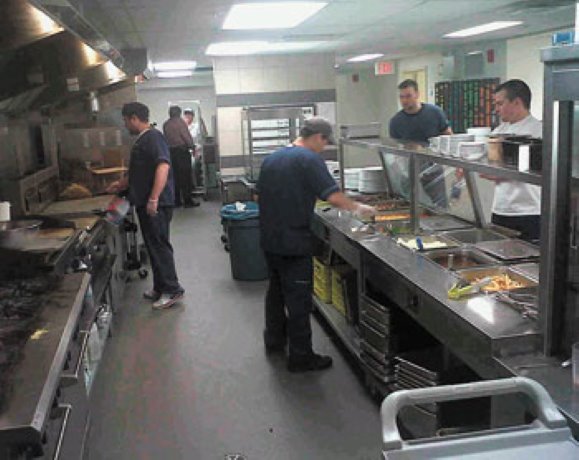What do construction workers like to eat? That’s the simple question that has occupied Walter Zuppinger, CEO of Domco Foodservice Group for more than 40 years.
What do construction workers like to eat? That's the simple question that has occupied Walter Zuppinger, CEO of Domco Foodservice Group for more than 40 years.
In business since 1945, the company is the largest independent Canadian food service company supplying remote sites, with five regional offices and more than 800 employees.
It currently serves 26 remote sites, providing food, janitorial and housekeeping services ranging from British Columbia to Northern Quebec.
Most of Domco’s construction catering contracts are centered on the resource industry.
If a construction camp contract goes well, the company has a good chance of landing the longer-term catering contract for an established production mine.
“You’re only as good as the last meal you serve, so we’re always focused on ensuring that the food meets the expectations of the construction crews,” said Zuppinger.
The logistics of food delivery play a big part in operating a remote site catering operation.
Just as important as the menu is the cost of delivering the food to various sites.
“We deal with a series of food wholesalers with distribution centres across Canada,” said Zuppinger.
“We find the closest warehouse and then determine the best way to deliver the food to the site. The cost of shipping the food can be huge and plays a really important part in accurately quoting our services.”
Canada Day at the Detour Gold Camp, north of Cochrane, Ont. is an example of mobile catering.
In most cases, deliveries are made by commercial transport truck on ground routes or ice roads.
On the other hand, food heading to the BHP Billiton Ekati Diamond Mine, north of Yellowknife, is shipped by plane from Edmonton, with the mine operator footing the air transportation bill.
One of the company’s largest current construction contracts serves 1,750 workers building the Detour Lake gold mine, located 185 kilometres northeast of Cochrane, Ont.
“Traditionally, the construction camp is not as comfortable as the permanent mining camp,” said Zuppinger.
“In a permanent camp, each room may have its own washroom. In a construction camp, a washroom may serve 10 people. The accommodations are simply a place to sleep before getting the hell to work.”
The camp dining facility is a huge, modular building, transported from use in the Alberta oilsands.
It features a large kitchen, replete with ovens and enough seating to serve the crews in two shifts.
Domco devotes 243 employees to the camp.
They offer a full range of catering, housekeeping and janitorial services.
Half the staff is on site at any given time.
Staff members work 11 hours a day over two or three weeks, then take the same period off.
“It’s a challenge to retain staff because not everyone likes to work in the north,” Zuppinger said.
“However, we’re now often bidding on contracts in a joint venture with First Nations on whose tribal lands the mine is located.
That helps provide us with more staff from a local workforce.”
Breakfast and dinner are eat-in hot meals, while lunch provides take-out offerings designed to keep workers close to their stations.
A crew of four is assigned to make nothing but sandwiches around the clock.
While bread is delivered to the site, all pies and pastries are baked in-house.
“People are more calorie- and nutrition-conscious these days, so the take-out lunches offer more options like fruit, yogurt, salads, granola bars and bottled water,” said Zuppinger.
Hot meal plans have also become more sensitive to the health and cultural needs of clientele.
The five-week menu rotation includes options for diabetics, meals designed for Muslim workers and dishes featuring local First Nations fare, such as fish or duck.
The latest wrinkle in construction catering is the fast food line, a separate food offering that offers such items as pizza, hamburgers and fries.
“It provides the familiar foods that people might eat closer to home or that they grew up with,” said Zuppinger.
“Sometimes the really hungry guys double-dip, getting a quick bite from one line, then moving to the next.”
In addition to talking to diners about their food requests, the staff conducts a more scientific survey of eating preferences, determining what’s left on the plate after the meal is over, then adjusting the menu to provide more popular selections.
Relying on traditional conceptions of what construction workers like to eat would be a mistake, said Zuppinger.
“We initially assumed that the workers would be relying more heavily on the traditional ham and cheese sandwich for lunch,” he said.
“The single most popular sandwich surprised us — peanut butter and jam.”











Recent Comments
comments for this post are closed